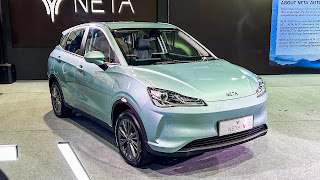In the ever-evolving world of electric vehicles (EVs), it seems that groundbreaking innovations are emerging at an astonishing pace. One recent development that has caught the attention of both enthusiasts and skeptics alike is the NETA EV, a purportedly affordable electric car with a price tag of just RM80,000. As electric vehicles become increasingly popular and accessible, the prospect of an EV at such an enticing price point raises eyebrows and questions. Is this too good to be true, or are we witnessing a paradigm shift in the automotive industry?
The Electric Revolution's Progress
The transition to electric vehicles has long been heralded as a crucial step toward reducing our carbon footprint and combating climate change. As more automakers commit to producing electric cars, prices have slowly but steadily decreased. Still, the idea of an EV priced at RM80,000 sounds almost implausible, given the current market trends.
Introducing the NETA EV
The NETA EV is making waves as a potential game-changer in the electric vehicle landscape. Positioned as a budget-friendly electric car, its advertised price point has raised skepticism among consumers and experts alike. But before dismissing the NETA EV as a hoax or marketing gimmick, it's important to delve into the specifics and analyze the factors that could potentially make such a price feasible.
Possible Cost-Cutting Measures
Several factors could contribute to the NETA EV's low price. Manufacturers have been exploring various cost-cutting measures to make EVs more affordable without compromising quality or performance. These measures may include:
Battery Technology: Batteries constitute a significant portion of an EV's cost. If NETA has managed to develop or source cost-effective battery technology, it could substantially reduce the overall price of the vehicle.
Simplified Design: Complex designs with intricate features can drive up manufacturing costs. If the NETA EV boasts a simplified design while maintaining essential features, it could result in a more budget-friendly price.
Production Scale: Achieving economies of scale through mass production can significantly bring down the per-unit cost of manufacturing. If NETA has managed to secure a robust production strategy, this could explain the surprisingly low price.
Scrutinizing the Claims
Given the inherent skepticism surrounding groundbreaking claims, it's crucial for consumers and industry observers to critically evaluate the NETA EV's advertised price. Questions to consider include:
Quality Assurance: Does the NETA EV sacrifice quality or safety to achieve its low price? Ensuring that the vehicle meets industry standards and adheres to safety regulations is paramount.
Range and Performance: Does the NETA EV deliver a competitive range and performance for its price? EV enthusiasts will want to confirm that they're getting value for their money.
Long-Term Viability: Can NETA sustain its pricing strategy in the long run, or is the RM80,000 tag a temporary promotional offer?
The Future of Affordable EVs
Whether the NETA EV lives up to its claims or not, its emergence serves as a reminder that the electric vehicle industry is in a constant state of flux. As technology evolves, we can expect prices to continue dropping and accessibility to increase. While skepticism is healthy, it's also important to remain open to the possibility of groundbreaking innovations that challenge the status quo.
In conclusion, the NETA EV's RM80,000 price point is both intriguing and questionable. As consumers, let's approach this development with cautious optimism, conducting thorough research and analysis before making any judgments. After all, the electrification of transportation is a journey filled with surprises, and the NETA EV might just be one of the many unexpected twists that shape the future of mobility.


